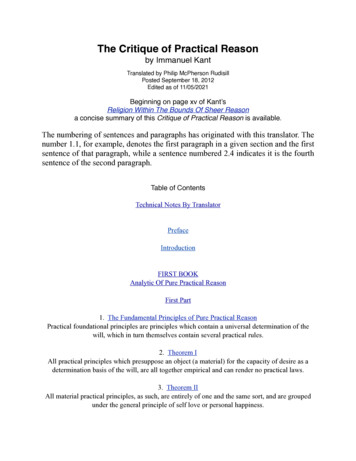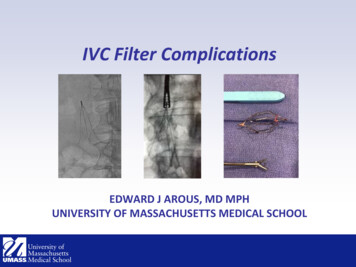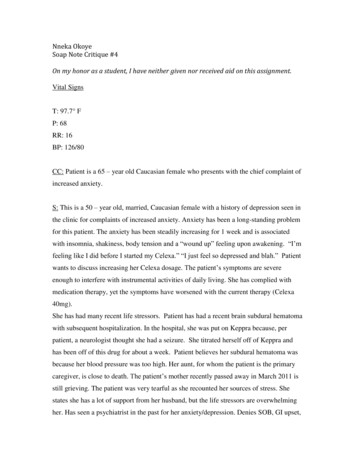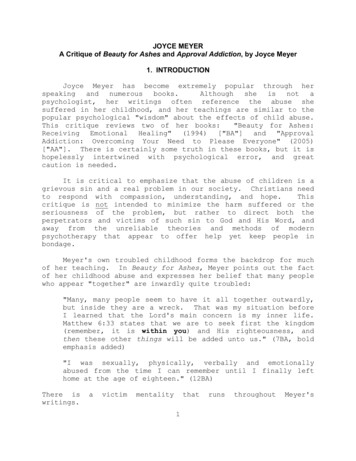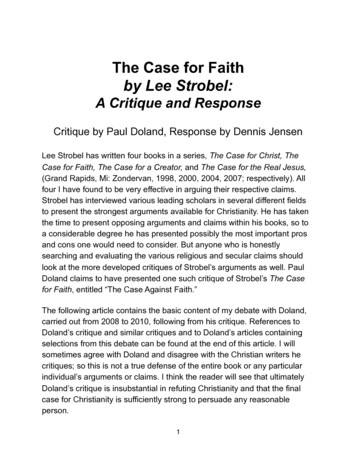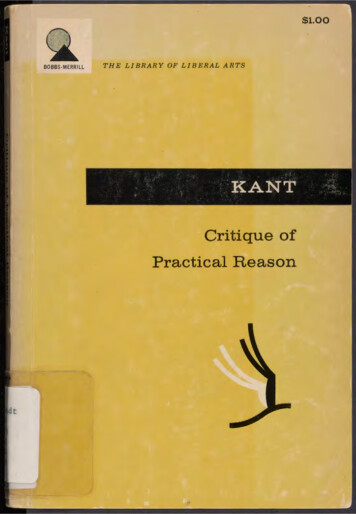
Transcription
1.00BOBBS-MERRILLTHELIBRARYOF LIBERALARTSCritiquePracticaldtofReason
IMMANUELKANTCritique of Practical ReasonTranslated,with an Introduction,byLEWIS WHITE BECKProfessor of Philosophy,University of RochesterA LIBERAL ARTS PRESS BOOKTHEBOBBS-MERRILLA SUBSIDIARYPublishers OF HOWARDI N O I AN APOCOMPANY, INC. CO,, INC,W, SAMSL. I S N E W YO R K
CONTENTSTRANSLATORNOTEON THESKETCHEDITIONOF KANT'SSELECTEDvii. . . . . . . . . . . . . . . . . . . . .xxAND WORK····· ·· ·· ··""' "'""'"" "·. . . .OF PRACTICAL. . .·· ·········· ·· ···· ······· ··" ·" "'·· ·· . ···. . . . . . . .DOCTRINEPRACTICALl.THEELEMENTSOF PUREPRACTICALOF315PUREPRINCIPLESOF PURE PRACTICALREASONREASON.I. Of the Deduction of the Principles of PurePractical Reason .II. Of the Right of Pure Reason to an Extensic;min Its Practical Use Which Is Not Polli bleto It in Its Speculative Use ."::.CHAPTERxxiiiREASONBOOK I. ANALYTICCHAPTEROFXXlREASON··· ····· ···· ··· ·· ···· ········· ········· ··· ···· ·· ··· ··. . . . .INTRODUCTIONp ART I.LIFEBIBLIOGRAPHYCRITIQUEPREFACE. . . . . . .' S INTRODUCTIONII.PRACTICALTHECONCEPTREASONOF AN OBJECTTHEINCENTIVESOFPURE4352OF PURE. . . . . . . . . . . . . .Of the Typic of Pure Practical JudgmentCHAPT E R III.17.5970PRACTICALREA SON . . . . . . . . . . . . . . . . . . . . . . .74Critical Elucid ation of the Ana lytic of PurePractical Reason .92V
CONTENTSVIBOOK II. DIALECTICOF PURE PRACTICALREASONCHAPTERI. A DIALECTICOF PURE PRACTICALREASON111IN GENERAL.CHAPTERII. THE DIALECTICOF PURE REASONIN DEFININGTHE CONCEPTOF THE HIGHESTGoon .I. The Antinomy of Practical Reason .ofof the AntinomyResolutionII. CriticalPractical Reason . . .III. On the Primacy of the Pure Practical Reasonin Its Association with Speculative Reason .IV. The Immortality of the Soul as a Postulate ofPure Practical Reason .V. The Existence of God as a Postulate of PurePractical Reason . .VI. On the Postulates of Pure Practical Reason inGeneral .VII. How Is It Possible to Conceive of ExtendingPure Reason in a Practical Respect WithoutasIts KnowledgeExtendingTherebySpeculative? .VIII. On Assent Arising from a Need of Pure ReasonIX. Of the Wise Adaptation of Man's CognitiveFaculties to His Practical Vocation .p ARTII.METHODOLOGYREASONCONCLUSIONOFPURE. . . .114117118124126128137139147151PRACTICAL. .155166
TRANSLATOR'SINTRODUCTIONIImmanuel Kant's Critique of Practical Reason, published in1788, is the second of his three Critiques, the others being theCritique of Pure Reason (1781) and the Critique of Judgment(1790) . It is likewise the s cond of his three most important writings in moral philosophy, the first being the Fundamental Principles (sometimes called the Foundations or the Groundwork)of the Metaphysic of Morals (1785), and the third being theMetaphysics of Morals (1797).The relation between the Critique of Practical Reason andthe Fundamental Principles of the Metaphysic of Morals ismuch like that of the Critique of Pure Reason to the Prolegomena. For each of the first two Critiques, Kant wrote a briefer,less "scholastic," work on the same topics. The shorter worksfollow the analytical or regressive method; they begin with experience and, .J;,e.gressupon its a priori presuppositions or principles without which it would not be possible to have that kindof experience. In these shorter works, starting points are foundin mathematical and scientific knowledge (Prolegomena) andin "common knowledge of morality" (in the Fundamental Principles). In each everything is based "u on something alreadyknown as trustworthy, from which we can set out with confidence and ascend to sources as yet unknown." 1 These "sourcesi s yet unknown" are tlie forms of intuition and categories (inthe Prolegomena) and the,!Iloral law and freedom (in the Fundamental Principles).The method of the Critiques, on the other hand, is synthetic.That is, they begin with principles and thence proceed to theexperiences which they organize, govern, and render intelligible. Only by this method can philosophical knowledge "present1Prolegomena §4.vii
(,.viiiCRITIQUEOF PRACTICALTRANSLATOR'SREASONall its articulations, as the structure of a peculiar cogmuvefaculty, in their natural combination." 2 The fritique of Practical Reason, therefore, begins as it were where the FundamentalrPrinciples ends, and retraces its steps . For this reason, Kant tells' us, the Critique of Practical Reason presupposes the Fundamental Principles only "in so far as that work giv s a preliminary acquaintance with the principle of duty and justifies adefinite formula of it; otherwise it is an independent work." 3This definite formula, of course, is the categorical imperative,reached in the second section of the Fundamental Principles1and in §7 of the Critique. )To be more specific, the Fundamental Principles, as the workgiving an analysis of ordinary moral consciousness, begins withcommon moral judgments and the felt constraint of duty. Itseeks to bring their basis to light, and does so by formulatingthe moral law expressed as a categorical imperative and a theoryof freedom as the condition for making and realizing the demands of this imperative. The Critique of Practical Reason, onthe other hand, begins with definitions, in a manner almostreminiscent of Spinoza, and proceeds quickly, in a quasi-deductive manner, to the formula of the moral law and the theory offreedom. The works, therefore, for a considerable distance goalong the same path, but in opposite directions.contains material which, KantNevertheless, the Critig.1&1:.says, would be out of place in the Fundamental Principles, orit must showlt he unit of practical and theoretical reason .4 1Thefull investigation of this unity constitutes the chief advancemade in the Critique of Practical Reason beyond Kant's earlierwork. This unity was asserted in the first Critique and assumedin the Fundamental Principl es; only in the Critique of Practical Reason is this assumption "deduced" or justified. Only inthe light of this larger and deeper problem of showing that thereIbid ., Intro. (Liberal Arts Press ed ., p. 11).Critique of Practical Reason, this edition, p. 8.Principles of the Metaphysic of Morals (Liberal4 FundamentalPress ed.), p. 7.INTRODUCTIONin its claims to. knowledge andis,no conflict of reason wi lfin its use in practical conduct does Kant deal adequately withmany of those most profound philosophical problems concerning the lations between knowing, believing, and acting.IIEven the titles of the works, properly understood, tell muchof this story of their intimate connection. There is a wholetheory implicit in the very words "metaphysics of morals,""critique," and "practical reason.""Metaphysics" means two things for Kant. It is alleged speculative knowledge of supersensible and unconditional reality;this is the old metaphysics which the Critique of Pure Reasonwas written to destroy. Then there is the metaphysics Kant attempted to establish, "metaphysics as science," "the inventoryof all our possessions ·through pure reason, systematically arranged,"5 "as mm of a pJj ori knowl! d e fwm mere concepts ."JIt has two parts: the metaphysics of nature, consisting of all thea priori principles of what is, and the metaphysics of morals,comprising all the a priori principles of what ought to be. 7 Butmany philosophers claimed that certain, rational knowledgeof God, freedom, and immortality belonged in the store-houseof metaphysics understood as knowledge of ultimate reality.Kant is primarily concerned to deny this, and he does so byshowing that such putative knowledge has no valid foundation.Such claims to knowledge are vain and empty or, in Kant'stechnical terminology, "dialectical."This brings us to Kant's conception of the function he assigns to a "critique. ' One task of a critique is the se !!:examination of reason for the purpose of discovering and eradicatingthe dialectical illusions of the older metaphysics. The secondtask of a critique is to rescue those principles which constitute2Critique of Pure Reason, A xx. Metaphysik der Sitten , Einleitung, ii. 7 Critique of Pure Reason, A 840 B 868.53ArtslX6
CRITIQUEXOF PRACTICALmetaphysics "as science" from the ruin threatened by universalempiricism, which not only raised doubts about the possibilityof speculative metaphysics but also tended to undermine knowledge even of nature and morals. 8 Critique is negatively an attack on pretensions to supersensible knowledge, which appearas metaphysical dogmatism and moral fanaticism; 9 affirmativelyit establishes the structure, range, use, and validity of concepts(like that of cause in the first Critique, duty iri the second) whichcannot be objectively valid if derived from experience, butwhich are essential if experience is to "make sense." Withouta critique having both these affirmative and negative functions,Kant thinks it is not possible to draw a line between legitimateand illegitimate metaphysics, or to defend legitimate knowledgefrom attacks properly made only on dialectical illusion masquerading as the higher wisdom.So much for the word "critique." And what is "practicalreason"? To say, as Kant does, tha!. ractical .!!son is-the same.as will is instructive only when we understand his theory ofreason itself. In the Critique of Pure Reason there are threecognitive faculties of the mind: sensibility, which is receptivityto sense data under the forms of space and time; understanding,which is the faculty of synthesizing these data into knowledgeof objects, the synthesis occurring under rules established byconcepts called categories; and reaso , which is the faculty ofsynthesizing knowledge of objects into systerr{s (such as the"realm of nature," the whole system of phenomena under laws).Reason guides the construction of knowledge in its systematicaspect, by directing our search for the absolute conditions ofall contingent conditions, which wiil support the entire edificeof kno'"wledge. This is td}e ideal of reason in its theoretical aspect, and when its search leads it to make assertions which concern supersensible realities which belong in the realm of theolder metaphysics, it is called "speculative reason."Now, Kant tells us, all things in nature, including humanCritique of Practical Reason, this edition, p. 12 and the ironical remarkat the end of the Preface, p. 14.9 Ibid., pp. 88, 141.8TRANSLATOR'SREASONINTRODUCTIONxibeings, behave in accordance with laws. But only a rationalbeing can have or act according to a conception of laws. A falling body, for instance, "obeys" Galileo's law in the sense ofmerely illustrating it; but man, as a being endowed with consciousness and reason, can govern his behavior by his conception of this law. By his knowledge of Galileo's law, he may decide whether it is safe to jump from a certain height, and (if his"will" is strong enough) may thereby overcome his fear ofdoing so. Such a conception of law is possible only to a rationalbeing; and we say that a man acts voluntarily when his conception of a law, and not his momentary impulses, governs his behavior. To take another example: a man as a creature of impulse unwittingly follows psychological laws in his sexualbehavior; but as a rational being, possessing insight into thecausal laws of psychology, he may discern consequences of hispossible actions, and thereby modify his behavior and act inways which in fact thwart his impulses. Such a man, we ordinarily say, has a strong will; he acts rationally, not merely impulsively;10 rational order and system are introduced into hisactivities by the governance of reason.We can thus see that when Kant says the will is nothing butpractical reason, what he says is not so very startling, but isimplicit even in the common usage of the word "will." "Will:.'is the name we ordinarily give to the subjective experience ofcontrol of impulse by reason, and not to the merely emotionalor 1mpu1sive aspect of behavior.The book before us is a critical examination of will understood in this sense, as practical reason, reason applied in conduct. And its main thesis is that though practical reason generally has an impulsive component or motive, which it moreor less successfully guides by maxims and rules of experience,it is also possible for a man's reason to guide his behavior without the motive force springing from variable, subjective im10Note that,morally, for hisof prudence, ofexample in theeven if we are not Kantians, we do not yet say that he actsself-control through strength of will may be merely a matterstaying out of trouble. Cf. Kant's tart remark on a similarCritique, p. 30.
XUCRITIQUEOF PRACTICALREASONpulses directed to the gaining of pleasure. Such a reason providesnot just the long-range control of impulses but, as pure practical reason, it can provide also the motives and set the ends ofaction. The law conceived by reason in this capacity is not anempirical law of nature, or of human nature as learned inpsychology, but it is the moral law, and the imperative to obeyit is a categorical imperative, not hypothetical and contingentupon the actual presence of a given impulse.Kant tells us, in the opening sentence, that the work is calledCritique of Practical Reason and not Critique of Pure PracticalReason, because its task is to show that ure reason can be practical, and it does so by a critical examination of reason's entireoth pure and empirical) practical use. This suggests that thisCritique has only the second, the affirmative, function distinguished above. But this is not correct, for there is a dialecticalillusion even in pure practical reason, as we shall see; and thismust be criticized.-Thelack of parallelism in the titles is unfortunate in another respect: it has led superficial readers andnot an insignificant number of philosophical thinkers into believing that Kant established a dichotomy between "pure" and"practical" reason. But if this is believed, it is safe to say thatnot a single doctrine of his ethical theory has been or can beunderstood. Kant is trying to show that: pure reason can bepractical, and must be practical if morality is not an illusio.n;he is trying to show that it racticaloLitself, and not merelyas "the servant of the passions" (Hume), i.e., in connection withother, non-rational components of personality. 11We are now in a position to appreciate the full import of thetitle of the book, Critique of Practical Reason. Affirmatively,the book is to work out the pure a priori laws of conduct, andthus to establish beyond sophistic criticism the existence of purepractical reason, whose dictates will constitute a metaphysicsof morals understood as rational knowledge of the moral law inall its ramifications. Negatively, it will examine the presuppositions of practical reason to prevent them from being passed off-As held by Aristotle (Nicomachaean Ethics, 1139a, 1177b; On the Soul,432b) and most other philosophers and psychologists.11TRANSLATOR'SINTRODUCTIONXlllas insight into a supersensible world. These two tasks are carriedout, respectively, in the "Analytic of Pure Practical Reason" andin the "Dialectic of Pure Practical Reason."IIIThe "Analytic" has as its task the establishment of the possibility of a priori (universal and necessary) practical principles(moral laws), and it accomplishes this in the first two chapters.They give the formula of the moral law (§ 7), its differencesfrom maxims and rules of practice(§§ 1-4), its intimate relationto the autonomy (freedom) of the will as practical reason (§§ 5,6, 8, and pp. 43-51 ), and the connection between moral principles and moral concepts (good and evil) (Chapter II). ChapterIII of the Analytic is one of the most effective of all of Kant'swritings, manifesting on every page his own profound moralcommitment and giving a vivid and memorable phenomenology of moral experience. Its purpose is to show the way in whichmen come to be moved by the thought of duty; and this accountof reverence for the law as the motive to morality has importantimplications for Kant's theory of moral education, as given inthe "Methodology" at the end of this Critique.Though the argument is somewhat more formal, elaborate,and rigorous, most of the Analytic will be at least partly familiarto those who have read the Fundamental Principles, and I shalltherefore turn to new material not touched upon, or at mostintimated, in the Fundamental Principles but fully developedin the present work. Most of this material is in the "Dialectic."IVTo understand fully the Dialectic of the second Critique, wemust recall some of the teachings of the Critique of Pure Reason.12 In the Dialectic of that book, Kant was concerned with12 Fortunately, at various places in the second Critique, Kant reminds thereader of what he has said in the first. But inasmuch as these passages may
"J,I1XVICRITIQUEOF PRACTICALREASONCritique. Assume, for the moment, that morality requires belief in God, freedom, and immortality-whyKant says it doesso will be mentioned later. If reason in its practical aspect (asthe "organ" of morality) requires that the theoretically emptyspace in the system of knowledge be filled by assumptions, indefault of which the moral experience would be illusory andthe moral law invalid; and if these assumptions conflict with noprinciples that theoretical reason can establish; then , says Kant,pure reason in its practical capacity has primacy over pure reason in its speculative (theoretical) capacity. It can thereforelegitimately make-indeed,if morality is not in vain, it mustmake-these assumptions. But it makes them not as expressions.of knowledge but as matters of faith, or as what Kant calls "practical postulates." 15 If we mistook the authority of practical reason and claimed that these postulates gave us any knowledge,we would not only exceed the competence of theoretical reasonbut would actually threaten the foundations of morals themselves.16The ideas of God, freedom, and immortality are merely possible for speculative reason, not actual. But Kant says that theyare necessary for morality. They therefore fit this "empty space"15Critique of Practical Reason, Bk. II, ch. II, sect. 3: "On the Primacy ofPure Practical Reason in its Association with Speculative Reason." This .chapter should be carefully compared with the writings of other defendersof the "right" or "will" to believe beyond theoretical evidence, among whomKant is often counted . But the differences between Kant and, for instance .William James are at least as important as the similarities. The chief difference is, in Kantian language, that since they have not shown that purereason can be practical (which, indeed, they deny), their claim that there is aright to believe beyond the evidence is based on premises having no objectivevalidity, and the resulting belief is therefore irrational and subjective. Kant,on the other hand, claims that the legitimate belief in these postulates isobjective and rational, though not cognitive; it is based on demands of purereason and not on what James called "our passional nature." What is unique ·in Kant's view is precisely the point that "rational" is not restricted in meaning to "cognitive ."16Critique of Practical Reason, Bk. II, ch. II, sect. 9: "Of the Wise Adapta tion of Man's Cognitive Faculties to his Practical Vocation."TRANSLATOR'SINTRODUCTIONxviiin the system of theoretical knowledge, and acceptance of themis justified by the primacy of practical reason.We turn now to the final question: how does Kant show thatmorality requires such postulates? The same answer does notfit all of them. The idea or postulate of freedom differs markedlyfrom the others, and therefore we must briefly discuss each ofthem separately. Generally speaking, we can say that freedomis required for the establishment of the moral law itself, whilethe other postulates are required only for the resolution of anantinomy into which practical reason itself falls.In the Dialectic of the Critique of Pure Reason, Kant develops an antinomy between the concept of freedom and that ofnatural c ation. That is, he gives a proof that the connection·of events under the laws of empirical science is the only necessary connection, and then he gives an equally valid proof thatthere is a "causality of freedom," i.e., that there can be initiateda new causa1 chain in nature. The first member of such a chainmight be an act of will which is not an effect of some earliernatural event. He resolves this antinomy by arguing that bothstatements are true and that there is no contradiction betweenthem. The first is true, but it concerns events only as phenomenain time. If the empirical events whic are th e objects of scientific knowledge were events among things in themselves, theprinciple of natural causation would be absolutely true withoutrestriction, there would be an irresolvable conflict between freedom and causal determinism, and freedom would have to besurrendered. But if the events we observe are only phenomena,i.e., appearances of things in themselves as organized by our ownsensibility and understanding, as he believes he has shown, inother parts of the Critique of Pure Reason, to be the case, thenthe causality of freedom might be true o elationof realities to appe J rances while mechanical determinism would stillhold of the connections among the observed events themselves.The two principles might therefore be true, each in its own .context. Thus the Critique of Pure Reason shows that freedomis not incompatible with natural necessity and is thus a possible
xviiiCRITIQUEOF PRACTICALREASONconcept. But the first Critique does not give any reason for believing that it is actual , i.e., that there is freedom.11The Critique of Practical Reason, however, shows that themoral law 1 which is given as a 'fact of pure reason ,' reciprocallyimplies and is implied by the concept of freedom.is In assertingthat man is morally obligated, Kant is asserting that freedom isreal, while nature, including human nature, can be understoodscientifically only under the principle of strict causal necessity.Man as a moral agent is not the same as man as a part of nature; and the act which the psychologist says is causally determined by heredity and environment can be said by the moralagent himself to be freely chosen. 19 Kant's concept of freedom,therefore, is not equivalent to that according to which free actions have no causes, or to the view, popular in his time and inours, that actions are free if they are psychologically determinedby one's own settled character and not by momentary stimuli.20The other two postulates are quite different, and it is generally recognized, even by Kant hims elf, that the argument forthem is less coercive. Pure practical reason has its own antinomyand the exposure and resolution of this antinomy is the negativetask of the Critique of Practical Reason. It arises in the conceptof "th gh st good," which is the ideal of moral perfectionconjoined with happiness proportionate to the degree of perfection attained. Striving for the highest good is required by themoral law, but the highest good cannot be made real unless thesoul is immortal and God exists. The moral law is vain if itcommands us to do the impossible; hence the moral law is invalid, or the highest good is possible. Now since we have the"fact of pure reason" to show that the moral law really doesbind us, and since the criticism of speculative reason showed17 This is not quite true in fact, for there are sections of the Critique ofPure Reason which are concerned with moral questions. It would be moreaccurate to say: a critique restricted to an examination of theoretical andspeculative reason would give no grounds for asserting more than the possibility of the idea of freedom.18 Critique of Practical Reason, pp. 3, 28f., 31.19 Ibid., pp. lOOf.20 Ibid., pp. 97ff.TRANSLATOR'SINTRODUCTIONxixno impossibility in either immortality or God (but only the impossibility of a theoretical proof), the assumptions are justified .We are therefore under a moral necessity to ascribe reality to ,,"God and immortality to ourselves; but we do so as a matter of /; ational faith, and not in the form of a claim to metaphysical )knowledge of the nature of ourselves and of the being of God.Hence the Critique of Practical Reason has two functions:affirmatively it defends those concepts without which moral experience would be unintelligible or impossible; negatively itrestrains the dogmatism and fanaticism which claim on moralgrounds to have an insight into ultimate metaphysical realities.There is a tale, invented by Heinrich Heine, that Kant demolished religious belief, but he saw how unhappy thismade his servant Lampe, the great philosopher showed that hewas al;;-; "good man" by writing the Critique of PracticalReason to give old Lampe his faith again . This is, of course, acaricature of the doctrine of the primacy of practical reason andits postulates. But if the reader will keep this story in mind as hereads the Dialectic, so that at the end he can decide whetherthere is a kernel of truth inside the husk of error in this anecdote, he can rightly feel that he has at least the beginning of realinsight into what is perhap the most important and profoundphilosophy of morals produced in modern times .LEWIS WHITEBECK
NOTEON THE EDITIONThis translation, first published in my edition of Kant'sCritique of Practical Reason and other Writings in MoralPhilosophy (Chicago, University of Chicago Press, 1949), isbased on careful comparison of the variant readings in theGerman editions of Natorp, Vorlander and Kellermann. Afew errors discovered in the Chicago edition have been corrected, and I am indebted to several reviewers of that bookfor bringing some of them to my attention. A much largernumber of minor changes have been made in the hope of rendering the readings in this edition somewhat smoother butwithout sacrificing accuracy . The pagination in the runningheads is that of the Prussian Academy edition, Volume V, andis appended in order to facilitate the use of secondary writingswhich generally, and should universally, cite that splendidedition. The folios in brackets inserted in the text at the endof a line indicate the approximate break of the pages of theAcademy edition.The translator has contributed a number of footnotes whichhave been bracketed. The other notes are those of the author.O.P.xx
PREFACEWhy this critique is called simply Critique of Practical Reason and not Critique of Pure Practical Reason, though the parallelism between it and the critique of speculative reason seemsto demand the latter title, will be sufficiently shown in thetreatise itself. Its task is merely to show that there is a pure practical reason, and, in order to do this, it critically examines reason's entire practical faculty. If it succeeds in this task, there isno need to examine the pure faculty itself to see whether it, likespeculative reason, presumptuously overreaches itself. For ifpure reason is actually practical, it will show its reality and thatof its concepts in actions, and all disputations which aim toprove its impossibility will be in vain.With the pure practical faculty of reason, the reality of trans enden l freedom is also confirmed. Indeed, it is substantiatedin the absolute sense needed by speculative reason in its use ofthe concept of causality, for this freedom is required if reasonis to rescue itself from the antinomy in which it is inevitablyentangled when attempting to think the unconditioned in acausal series. For speculative reason, the concept of freedom wasproblematic but not impossible; that is to say, speculative reason could think of freedom without contradiction, but it c d assure any objective reali ty to it. Reason showea freedom tobe conceivable only in order that its supposed impossibilitymight not endanger reason's very being and plunge it into anabyss of skepticism.The concept olfreedom, in so kr as its reality is roved by/1/fill apodictic law of practical reason, is the keystone of the whole//speculaofeven}mdreasonpureotarchitecture of the systemAll other conc Tts (those of God .and immortal- [4] ason.J!y) which, as mere ideas, are unsupported by anything in specu/lative reason now attach themselves to the concept of freedomwith it and through it, tability and objective realit . in,--[4]-
4CRITIQUEOF PRACTICALREASON[5]That is, their possibility is proved by the fact that there reallyis freedom, for this idea is revealed by the moral law.Freedom, however, among all the ideas of speculative reasonis JJ1e onl one w o eossibilit a priori. We do notunderstand it, but we know it as the condition 1 of the moral lawwhich we do know. The ideas of God and immortality are, onthe contrary, not conditions of the moral law, but only conditions of the necessary object of a will which is determined bythis law, this will being merely the practical use of our purereason. Hence we cannot say that we know or understand eitherthe reality or even the possibility of these ideas. Nevertheless,they are the conditions of applying the morally determined willto the objec
'the Reason the Funda Principles work giv s prelimi a work." 3 imperative, the Principles and 1 of the Critique. ) the Principles, work with It formulating theory de The Reason, on almost quasi-deduc of go directions. the Critig.1&1:. Kant the Principles, or must showlt he theoretical reason
